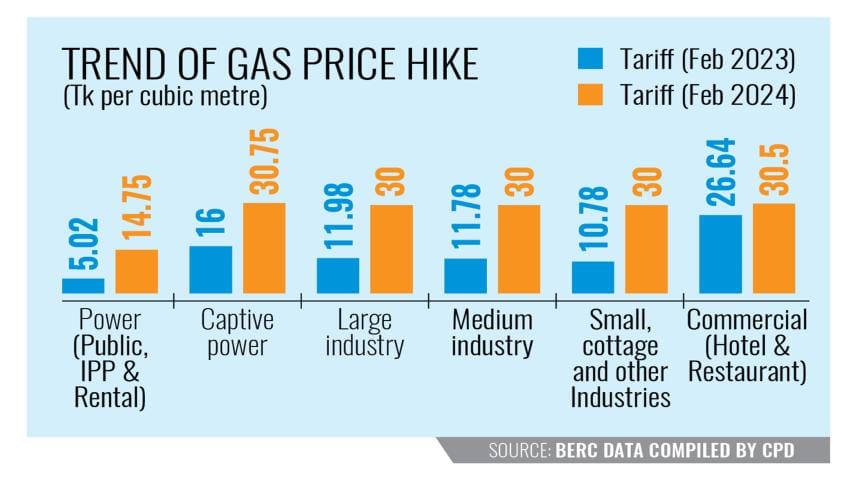Is this the right time to hike gas prices?

The Bangladesh Energy Regulatory Commission (BERC) is going to hold a public hearing tomorrow on the proposed hike in gas prices for industrial use.
In a proposal submitted in January this year, gas suppliers suggested the government, through the BERC, hike gas prices by 150 percent for new gas connections and 50 percent for expansion of existing industrial units to Tk 75.72 per unit.
Businesses have expressed concern on different occasions over the issue, saying such an increase would kill industries by doubling the cost of production at a critical time.
The government's reason for hiking gas prices is to minimise subsidies to the energy sector and to cover the import price of liquified natural gas at higher prices.
Industry insiders say the country is becoming increasingly reliant on expensive imported energy -- with estimates suggesting the country will have more than 90 percent dependence on imported energy sources by 2030 -- instead of exploring domestic gas reserves.
Industry owners, especially entrepreneurs in the primary textile sector, which has investment amounting to around $23 billion, said that they are already overburdened by the abnormal hike in gas prices in February 2023, which caused prices to double from Tk 16 to Tk 32 per unit with a commitment to providing an adequate supply of gas.
However, industry owners complain that the gas supply did not increase, forcing them to run units at half of their capacity.
At the same time, around Tk 10,000 crore worth of unsold yarn has been stockpiled at different mills due to an influx of cheap Indian yarn, which is cheaper due to the subsidies provided by its government.
In case of Bangladesh, the government reduced the subsidy to 1 percent and Indian government gives more than 3 percent subsidy.
Of total gas consumption, captive power plants, including those in the primary textile sector and other industries, use 37 percent, according to data from the Bangladesh Textile Mills Association (BTMA), which added that gas prices were hiked by 256.5 percent over the past five years.
So, industry people and economists say that this is not the proper time to increase gas prices as it would not improve gas supply to industries.
Alongside the perennial gas crisis, the industrial sector has been struggling to survive in the face of the severe fallout of the Covid-19 pandemic, Russia-Ukraine war, high inflationary pressure and nationwide political upheaval last year.
A good number of work orders of the garment sector were shifted to neighbouring countries because of the political and labour unrest in Bangladesh last year.
The export-oriented textile and garment sectors are also facing a working capital shortfall owing to the devaluation of the taka against the US dollar and a shortage of US dollars in the banking system.
Moreover, the bank interest rate varies between 15 percent to 16 percent, making capital harder to access.
Anwar ul Alam Chowdhury, president of the Bangladesh Chamber of Industries, said if there is no growth in industries, they ultimately fall sick. The proposed price hike will not be viable now as the industries are going through a tough time, he added.
Khondaker Golam Moazzem, research director at the Centre for Policy Dialogue, echoed Chowdhury's views.
Moazzem said incidents of gas leaks are also higher in Bangladesh, which indicates that the sector lacks governance.
The gas price hike may not increase the gas supply, he said adding that even hiking prices may not be enough to end the crisis. So, it is a lame excuse that LNG supply will be increased by hiking the gas price, he said.
Masrur Reaz, chairman of the Policy Exchange of Bangladesh said the textile, garment and steel sectors will be hit hardest by the price hike.
He also believed the gas supply may not increase even prices are hiked.
Razeeb Haider, managing director of Outpace Spinning Mills Ltd, urged the government to explore gas in order to reduce the dependence on expensive imported LNG.
In the upcoming fiscal year, which begins on July 1, the subsidy allocation is likely to be Tk 112,000 crore, up from Tk 100,174 crore in the outgoing fiscal year.
The power sector is likely to get Tk 42,000 crore in FY25. The government had earmarked Tk 35,000 crore in FY24. Before FY22, the subsidy allocation for the power sector was between Tk 7,000 crore and Tk 9,000 crore.




 For all latest news, follow The Daily Star's Google News channel.
For all latest news, follow The Daily Star's Google News channel. 
Comments